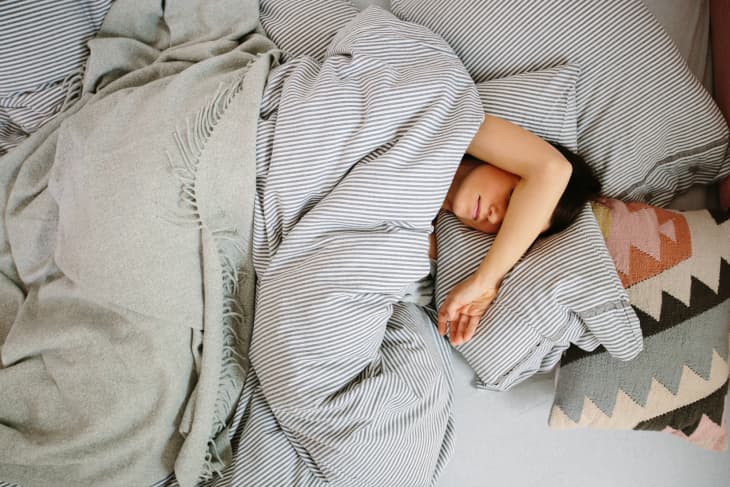4 Tricks for Falling Asleep When It’s Light Out, According to Night Shift Workers

Sleep is the body’s way of replenishing mental and physical energy. When you work nontraditional hours like early morning or overnight shifts or rotate between them frequently, getting enough sleep can be challenging. Exposure to sunlight influences your circadian rhythms, aka your body’s internal clock that tells you when to sleep and wake up.
Circadian rhythms help control different functions including metabolism, body temperature, and sleep. Because working a night shift can disrupt your sleep-wake cycle, you might be wondering how to sleep during the day when working nights. This guide will help you set up your home and create healthy habits to sleep more comfortably and soundly when it’s light out.
Tips on How to Sleep During the Day When Working Nights
Poor sleep can leave you feeling groggy — especially when your work schedule is misaligned with environmental cues like darkness. As a result, you might have a tough time doing things that require memory and concentration, making day-to-day life harder overall. Here are some expert-backed tips on how to improve daytime sleep, along with advice from night shift workers.
Manage Light Exposure
When you’re commuting home after a shift, “limit your exposure to bright light by wearing sunglasses and avoiding screens, blue light, or bright lights at home,” says Dr. Shelby Harris, director of sleep health at Sleepopolis.
Because light affects your sleep-wake cycle, “try wearing a sleep mask or using blackout curtains to darken your room,” says Julia Forbes, a certified sleep science coach and lead reviewer at Sleep Advisor.
Cofounder and CEO Katie Sarna spends her nights making organic Popsicles with her husband for their company, Santa Cruz Fungi. Because of that, his aunt gifted the couple a sleep mask which Sarna describes as a “game-changer” for daytime sleep. “The squishy mask blocks out 100% of the light, stays on all night even when we’re tossing and turning, and is perfect to stash in our bags when we go camping,” she says.
Just as blocking out light can promote daytime sleep, getting enough light during an overnight shift can keep you alert and focused. Cali Bahrenfuss, who currently works as a sleep coach and spent more than 10 years working overnight shifts as a traveling sleep technologist, says she makes a point of waking up to bright light by opening the curtains or going outside and using light therapy devices during overnight shifts. “When I introduced bright light into my working hours, I found a noticeable improvement in my sleep quality and was no longer waking often,” she says.
Develop a Consistent Routine
If you’re struggling to sleep during the day when working nights, it’s a good idea to have a consistent bedtime routine. “Try your best to go to bed and wake up at the same time every day, even on your days off,” Harris says. Maintaining a regular sleep schedule and having a calming pre-sleep routine, like reading or taking a warm bath, can signal to your body that it’s time to sleep, she adds.
Ashly Jean, an ER nurse who’s been working the night shift for four years, says that reading before bed has her asleep within 10 to 15 minutes. “When my eyes start closing, I’ll put my book down, pull on my sleep mask, and I’m out until my alarm goes off,” she says.
Bahrenfuss agrees, saying that a bedtime routine relaxes her body and mind. “This can be as simple as taking a quick shower, or more in-depth like meditating, deep breathing, or doing yoga nigra,” she says.
Create a Comfortable Environment
Figuring out how to sleep during the day when working nights may involve some experimenting to see what works best for you. If noise is keeping you awake, Forbes recommends using a fan or earplugs, or investing in a white noise machine to mask background noise.
“Initially, I relied on a noise machine app on my phone, but its tone and pitch weren’t quite right, eventually hindering rather than helping our sleep,” Sarna says. After discovering a fan-powered sleep machine while staying at a hotel, she purchased one for their home. “This little machine has dramatically improved the quality of our sleep by drowning out daytime neighborhood noise that used to set off our three little dogs,” she adds.
Aside from blocking noise, keeping your room at an optimal temperature can promote restful sleep. Harris suggests setting the thermostat between 60 and 67 degrees Fahrenheit. “Make sure your bedding is comfortable and breathable, with supportive pillows,” she says.
Make Sleep-Conscious Lifestyle Choices
As you’re winding down for the night, “you should do your best to avoid caffeine and heavy meals close to bedtime and practice relaxation techniques like deep breathing or meditation,” Harris says. Bahrenfuss avoids large meals before bedtime, instead opting for a light snack when she’s hungry.
Both Sarna and Jean find that taking magnesium and drinking water helps them fall asleep faster. Some studies using observational data suggest that magnesium is associated with enhanced sleep quality, but there’s room for more clinical research. As always, it’s a good idea to consult with your doctor before taking medications or supplements.
Another tip from Jean is turning on the do-not-disturb setting on her phone before bedtime. “I can be dead tired but if I’m on my phone, I will stay up for another hour just scrolling away,” she says. She also enjoys falling asleep with the scent of lavender and recommends using an oil diffuser.
Whether you’re new to working the night shift or looking for ways to catch up on rest with daytime sleep, having a consistent routine and a calming environment can help your body adapt when your sleep-wake cycle gets out of sync.